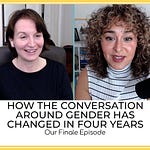The relationship between homophobia and gender medicine is deeply intertwined, with historical and contemporary practices shedding light on troubling patterns. Historically, gender-nonconforming individuals were often pathologized and subjected to medical interventions under the guise of correcting deviance. Today, these practices persist, albeit under new narratives that often frame gender nonconformity as a medical issue requiring intervention, such as transitioning.
Emerging trends reveal the influence of social contagion, with cultural narratives and social media amplifying gender identity struggles among vulnerable populations, particularly youth. This surge raises critical questions about the lack of scientific rigor in therapeutic practices, the ethics of irreversible medical procedures, and the neglect of alternative psychological or social supports. These patterns reflect a broader societal discomfort with nonconformity and a tendency to medicalize identities rather than embrace diversity.
In this bonus episode for premium subscribers, Glenna Goldis argues that modern gender medicine perpetuates homophobia by medicalizing gender nonconformity, effectively pathologizing same-sex attraction in a way that parallels past efforts to suppress homosexuality. She references the 2015 APA guidelines, which shifted the framework for addressing gender dysphoria, emphasizing affirmation and, often, medical intervention, suggesting that these guidelines reframe homosexuality as something to be corrected if it appears intertwined with gender nonconformity. She advocates for a more critical examination of these practices, urging evidence-based approaches that prioritize genuine understanding and acceptance over medicalization.
Watch our full length episode with Glenna Goldis:













